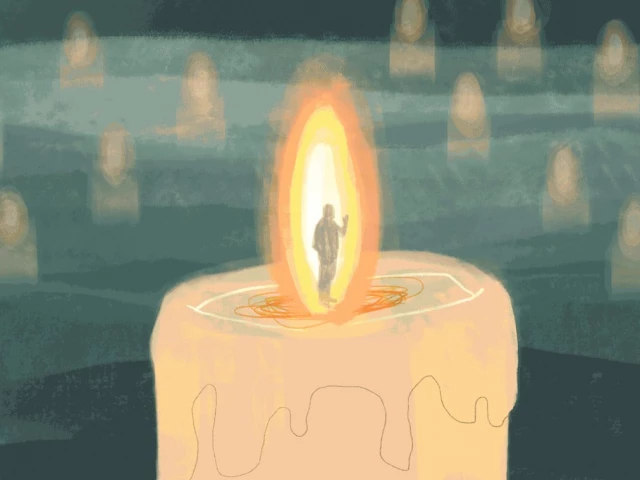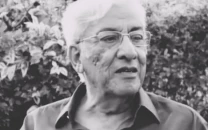How AI is changing the way we grieve
From voice clones to digital avatars, artificial intelligence is reshaping preservation of memories

When Diego Felix Dos Santos lost his father unexpectedly last year, he thought he would never hear his voice again.
The 39-year-old flew to his native Brazil to be with his family, and when he returned to Edinburgh, the silence hit him harder than he anticipated. "I had nothing to actually remind me of my dad," he recalls.
Then came AI. With only a voice note his father had sent from his hospital bed, Dos Santos turned to Eleven Labs, a voice-cloning platform founded in 2022. For $22 a month, he uploaded the recording and, within minutes, could generate new messages in his father's voice.
The results startled him: "The tone of the voice is pretty perfect. It feels like, almost, he's here."
On the app, his father's familiar words ring out: "Hi son, how are you? Kisses. I love you, bossy" — using the childhood nickname he always called him. While his religious family initially balked at the idea of digitally resurrecting a loved one, they eventually accepted his decision.
Now, Dos Santos and his wife, who has lived with cancer since 2013, are considering creating their own voice clones for their children.
Dos Santos' story reflects a wider movement: people using AI not only to remember loved ones but to simulate them. The growing "grief tech" industry offers voice clones, interactive avatars and digital twins that preserve fragments of people long after they are gone.
US-based start-ups such as StoryFile, which records people for interactive video playback, and HereAfter AI, which builds voice avatars, promise to keep memories alive. Eternos, a Palo Alto platform founded in 2024, takes the idea further by offering AI "digital twins."
For $25 a month, subscribers can create legacy accounts that remain accessible after death.
Robert LoCascio, who founded Eternos after losing his father, says more than 400 people have already signed up. One of them was Michael Bommer, an engineer who learned of his terminal cancer diagnosis and decided to leave behind an AI version of himself.
Bommer died last year, but his wife Anett says the avatar has been comforting. "I feel him close in my life through the AI," she says. "It was his last heartfelt project, and this has now become part of my life."
For companies behind this technology, the goal is not to create ghosts but to preserve memory. "These stories would cease to exist without some type of interference," says Alex Quinn, CEO of Authentic Interactions Inc, which owns StoryFile.
While avatars cannot comment on the weather or politics, they can capture essence, anecdotes and personality. "I don't think anyone ever wants to see someone's history and someone's memory completely go," Quinn adds.
Ethics and consent
But as demand grows, so do concerns. Chief among them is consent: what does it mean to digitally resurrect someone who cannot agree to it? LoCascio says Eternos refuses to create avatars of people who are unable to give permission, requiring clients to record their voice twice as verification. "We won't cross the line," he insists.
Eleven Labs, by contrast, allows posthumous cloning with fewer safeguards and did not respond to requests for comment.
Researchers warn of slippery ground. A Cambridge University study in 2024 called for stronger safety protocols around what it termed the "digital afterlife industry." Katarzyna Nowaczyk-Basi?ska, who co-authored the report, says transparency on data is critical.
"We have no idea how this data will be used in two or 10 years, or how the technology will evolve," she warns. She suggests treating consent not as a one-off signature but as an ongoing process, revisited as AI capabilities change.
Beyond ethics, psychologists worry about the emotional toll. Could such tools keep mourners stuck in their grief rather than moving through it?
Cody Delistraty, author of The Grief Cure, argues that mourning cannot be shortcut through an algorithm. "Grief is individualised," he says. "You can't put it through the sieve of a digital avatar and expect to get something really positive."
Yet users like Anett Bommer suggest the risk may be overstated. She says she didn't lean on her husband's avatar during her early grieving, but it remains a valuable reminder alongside photos, drawings and letters. "The relationship to loss hasn't changed anything," she says. "It's just another tool."
Andy Langford, clinical director at UK bereavement charity Cruse, takes a balanced view. While it is too early to draw conclusions, he stresses the need for caution. "We need to do a bit of both - the grieving and the living," he says. "Technology can't replace the hard work of processing loss."
For Dos Santos, AI was never about avoiding grief but about regaining connection. "There are specific moments in life when I would normally call him for advice," he says. AI cannot bring his father back, but it can recreate fragments of those conversations — the "magical moments" he now treasures.
The voice clone does not fool him into believing his father is alive, but it bridges a silence that once felt unbearable. In that way, grief tech may not erase mourning but, for some, soften its edges. As AI continues to weave into daily life, its role in how we remember and grieve will only expand. Whether that becomes a comfort or a complication may depend less on the technology itself than on how we choose to use it - as a crutch, a memorial, or a conversation across time.



















COMMENTS
Comments are moderated and generally will be posted if they are on-topic and not abusive.
For more information, please see our Comments FAQ